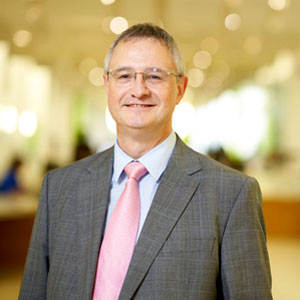Who we fund
We are excited to be funding some of the leading brain tumour researchers in the UK. Find out more about them, their work and their motivation in our interviews below.
The field of brain tumour research is greatly varied, with over 130 different tumour types in existence, therefore we fund researchers who each have different expertise. Our researchers are investigating how changes to our genes are linked to tumour development, how our immune system can be primed to attack tumour cells and how drugs can be developed which target the tumour cells only, among many other areas of research.
Adult brain tumour researchers
Here are the researchers we are currently funding to investigate and further our understanding or find new treatments for adult brain tumours

Dr Ola Rominiyi
Investigating DNA repair on a cell-by-cell basis in glioblastoma
Dr. Ola Rominiyi at the University of Sheffield is researching DNA repair in glioblastoma on a cellular level to identify treatment vulnerabilities. His work aims to create new treatment strategies with DNA repair inhibitor drugs that are more effective and have fewer side effects.

Dr Christopher Mount
Engineering cells of the immune system to target the complex mixtures of cells in adult and paediatric gliomas
Dr. Mount from Harvard Medical School is developing a new approach to treat gliomas by engineering immune cells to specifically identify and destroy multiple types of cells within the tumour.

Dr Mara De Martino
Shining a light on the role of lipid metabolism as a barrier to successful brain tumour treatment
Dr Mara De Martino at Weill Cornell Medicine is investigating the connection between lipid metabolism and immune escape in glioblastoma. Her goal is to identify molecules that promote treatment resistance and develop novel treatments targeting lipid pathways to enhance immunotherapy effectiveness against brain malignancies
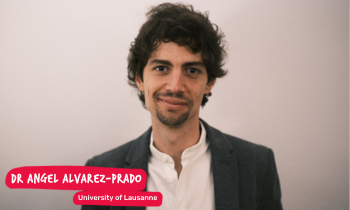
Dr Angel Alvarez-Prado
Hijacking an innate immune mechanism present in all malignant cells
Dr Angel Alvarez-Prado at the University of Lausanne is developing a novel therapeutic approach to treat glioblastoma by inhibiting ADAR1 in combination with TME-targeted immunotherapies, targeting cancer cells and their supporting microenvironment.

Dr Geraldeh Zadeh
Liquid biomarkers to change meningioma treatment
This project is advancing research into how aggressive meningiomas can be diagnosed and how their treatment responses can be predicted. In collaboration with a major UK-led clinical trial and using advanced artificial intelligence, the team are striving towards tomorrow’s clinical care
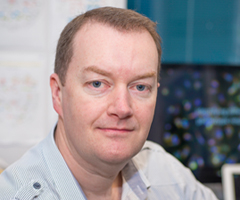
Professor Neil Carragher
Targeting, treating and defeating glioblastoma
Professor Carragher will adopt a systematic approach to find new drug targets and new drug combinations to treat glioblastomas. In addition to discovering new combinations of drugs, they’ll continue their work by testing drug combinations already discovered by their team. This grant will allow researchers to suggest new combinations of therapies which have the greatest chance of being effective and well-tolerated in people. We hope that these new therapy combinations will signify a real step-change in the lives of people with a glioblastoma, improving quality of life and length of survival.
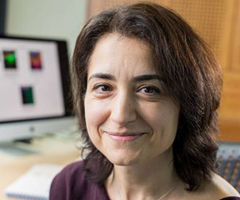
Professor Simona Parrinello
Mapping glioblastoma cells
Professor Parrinello, and her colleagues at Imperial College London, aim to understand how glioblastomas spread into the brain and how they use small molecules as messengers to communicate with surrounding cells.

Professor Susan Short
ARISTOCRAT: A randomised phase II study of temozolomide with or without cannabinoids in patients with recurrent glioblastoma
Professor Susan Short and her team will explore the benefit of cannabis derivatives as a form of treatment to improve both length and quality of life for people living with recurrent Glioblastoma.

Dr Jun Ishihara
Elimination of recurrent glioblastoma using tumour-collagen targeted IL-12

Dr Tyler Miller
Reprogramming glioma-associated myeloid cells to enable effective
Dr. Tyler Miller is a Research Fellow at Dana Farber Cancer Institute and Massachusetts General Hospital, Boston, USA. Tyler is mentored by Professor Bradley Bernstein.

Dr Spencer Watson
Multi-Omic Analysis of Environment-Mediated Glioblastoma Dormancy and Recurrence
Dr Spencer S Watson is a Postdoctoral Researcher in the Ludwig Institute for Cancer Research at the University of Lausanne Department of Oncology, Switzerland. Spencer is mentored by Professor Johanna Joyce.
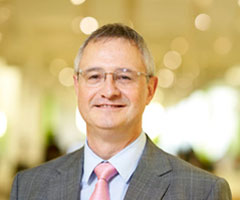
Professor Colin Watts
Amplifying drug delivery across the blood brain barrier using injectable gels
Professor Colin Watts and his team at the University of Cambridge are testing drug-containing gels as a new delivery method for the treatment of high grade brain tumours.
The Tessa Jowell BRAIN-MATRIX
A first-of-its-kind clinical trial enabling doctors to treat brain tumours with drugs that are more targeted than ever before.
Although the trial is being led from the UK, we expect it to deliver global impact for brain cancer patients.
Paediatric brain tumour researchers
Here are the researchers we are currently funding to investigate and further our understanding or find new treatments for paediatric brain tumours

Dr Jessica Taylor
Identifying a specific subtype of brain tumour without surgery
Dr Jessica Taylor at the University of Cambridge is developing a novel strategy called ADCIPs to identify and treat WNT-medulloblastoma, a highly curable brain tumour in children, without the need for surgery.

Professor Marcel Kool
Growing model brains in the search for new treatments

Professor Juan Pedro Martinez-Barbera
Targeting non-dividing cells in childhood high-grade tumours

Dr David Jones
The Everest Centre
The Everest Centre is being financed by The Brain Tumour Charity with money raised by the family and friends of Toby Ritchie, who was diagnosed with a low grade brain tumour at the age of five.
The centre will fund several, vital research projects that will help us understand more about low grade paediatric brain tumours and trial new treatments.









